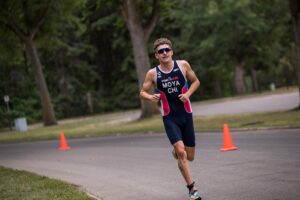Aerobic Exercise and Cognition
The most common reaction, by those who are sedentary, to my 30-year avocation of triathlon is that it is proof of my dementia. Turns out it may be my inoculation against it.
A recent study might support the view that those who thought triathletes crazy were wrong. We may be in better possession of our faculties than most of our cohorts, especially as we age.
The evidence was published last month in the journal Gerontology. Researchers at King's College London demonstrated that leg strength is tied to an improvement in brain function as we age. Culling subjects from the TwinsUK volunteer registry, scientists studied 324 healthy female twins aged 43 to 73 (average age 55) over a ten-year period. Various markers were analyzed, but the strongest predictor of late-age brain function was leg power measured at the onset of the study.

Leg power was chosen because answers to questions about physical activity are found to be less reliable than simply measuring fitness or, in this case, an estimation of it. In other words, it wasn't leg power specifically but exercise that was studied. Leg power was used as a proxy for exercise, because those who answer questions about their exercise habits don't answer those questions reliably enough for the purposes of a study.
Using identical twins means researchers don't need to account for genetic differences and differences in early-life environments. The twins with greater mean leg power as measured at the beginning of the study scored better in thinking, learning, and memory at end of the study.
The study did not look specifically at dementia. Nevertheless, this is what my mind ran to when I read about this study. The Alzheimer's Association reports that 12 percent of those over the age of 65 have Alzheimer's. About a third of all who are over the age of 85 have Alzheimer's. Women are 50 percent more likely than men to suffer from Alzheimer's, so, doing the math, if you're a woman Alzheimer's looms large (per the Alzheimer's Association's Annual Report). Alzheimer's is just one form of dementia that afflicts us as we age.
When I read about Alzheimer's here is what I routinely see, as Alzheimer's prevention:
1. Regular exercise
2. Healthy diet
3. Mental stimulation
4. Quality sleep
5. Stress management
6. An active social life
Yes, a genetic predisposition to Alzheimer's is undeniable. Still, according to the Alzheimer's Research & Prevention Foundation, regular physical exercise is the biggie. Obesity is a huge precursor to Alzheimer's. Beyond exercise and a vibrant exercise of one's brain, a Mediterranean diet is big: fruits and vegetables, seafood, olive oil, hearty grains, and an avoidance of trans fats, saturated fats and partially hydrogenated oils.
Moving forward, I wonder if there is more to learn, this time directly from triathlon. I have been blessed to know a lot of women who are now in their 70s or 80s and who compete in triathlon. Women in this age group overwhelmingly tend to be long-timers in our sport, which makes sense: How many women are likely to begin the sport of triathlon in their 70s? I can't remember any who've descended into dementia.
Anecdotes from my memory a relevant study does not make. Still, as we keep good age-specific stats in our sport, I wonder if triathlon is not a good candidate for a retrospective cohort study, analyzing how a group hyper-active into its 60s a generation ago has fared in cognitive function 20 and 25 years later.
In the meantime, the King's College London study bodes well for those who've made triathlon and its constituent sports a life choice.







Start the discussion at forum.slowtwitch.com